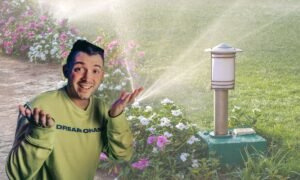When your garden thrives thanks to a well-maintained irrigation system, the last thing you want is for a faulty sprinkler timer to derail your efforts. Sprinkler timers are essential tools that automate watering schedules, ensuring your plants get the right amount of water without constant supervision. But how long do these timers actually last? And what can you do to extend their lifespan?
Let’s dive into the details to answer these questions and keep your garden in peak condition.

Understanding Sprinkler Timer Lifespan
I guide readers through replacing a sprinkler system controller to keep their irrigation on schedule. The youtube video below: How to Replace A Sprinkler System Controller by Ewing Outdoor Supply (YouTube, June 1, 2017) walks through the steps clearly, making it easy to swap out an old or faulty controller.
The Typical Lifespan of Sprinkler Timers
Sprinkler timers vary in lifespan depending on their type and quality. Here’s a breakdown of the different types and their expected longevity:
| Type | Lifespan | Key Features | Cost Range |
|---|---|---|---|
| Mechanical | 5-10 years | Simple operation, no electronics | $20 – $50 |
| Digital | 7-12 years | Digital display, programmable schedules | $50 – $150 |
| Smart | 5-10 years | Remote control, weather-based adjustments | $100 – $300 |
Mechanical Timers: Known for their durability, mechanical timers often last between 5 and 10 years. They are robust due to their lack of electronic components, which makes them less susceptible to power surges and weather damage.
Digital Timers: These timers usually last between 7 and 12 years. They offer more precise scheduling and programming options but require regular battery changes and can be affected by power fluctuations.
Smart Timers: With a lifespan of 5 to 10 years, smart timers offer advanced features such as remote control and weather-based adjustments. While they are convenient and efficient, their reliance on technology means they are subject to issues related to connectivity and software updates. Smart timers offer benefits like remote control and weather-based adjustments, helping you conserve water while keeping your garden lush.
Factors Affecting Sprinkler Timer Longevity
Quality and Brand
The quality of a sprinkler timer significantly impacts its lifespan. High-quality brands often use better materials and offer more reliable warranties. Brands like Rain Bird, Orbit, and Hunter are known for their durability. Look for timers with:
- Certifications: Ensuring the product meets industry standards.
- Extended Warranties: Providing peace of mind and protection against defects.
Installation
Proper installation is crucial for extending the life of your sprinkler timer.
Here’s how you can ensure a successful setup:
- Avoid Moisture Exposure: Install the timer in a dry, sheltered location to prevent water damage.
- Protect from Extreme Temperatures: Avoid placing the timer in areas with extreme heat or cold.
- Consider Professional Installation: Hiring a professional ensures that the timer is set up correctly, reducing the risk of installation-related issues.
Environmental Factors
Local environmental conditions in Wichita, Kansas, can impact your timer’s longevity.
Here’s what to consider:
- Soil Conditions: Poor drainage or heavy soil can cause moisture buildup around the timer, leading to potential damage.
- Water Quality: Hard water with high mineral content can cause buildup and corrosion. Consider using a water softener to mitigate these effects.
Power Surges
Power surges can damage electronic timers. To protect your investment:
- Use Surge Protectors: Install surge protectors to shield your timer from electrical spikes.
- Check Power Sources: Ensure that the timer is connected to a stable and protected power source.
Maintenance Tips for Long-Lasting Timers
Regular Cleaning
Keeping your sprinkler timer and its components clean can prevent malfunctions:
- Clean Timer Components: Dust and debris can affect performance. Wipe down the timer with a dry cloth and avoid using harsh chemicals.
- Clean Sprinkler Heads: Regularly remove debris from sprinkler heads to ensure even water distribution.
Battery Replacement
For digital and smart timers, regular battery replacement is essential:
- Replace Batteries Annually: Follow the manufacturer’s guidelines for battery replacement to ensure continuous operation.
- Proper Disposal: Dispose of old batteries according to local regulations to minimize environmental impact.
Winterization
Protect your timer during winter months to prevent damage:
- Disconnect Power: For digital and smart timers, unplug or disconnect them from the power source.
- Use Weatherproof Covers: Install covers to protect the timer from snow and ice.
- Store in a Dry Place: If possible, move the timer indoors during extreme cold weather.
Seasonal Maintenance
Adapt your maintenance routine to seasonal changes:
- Summer: Check for overheating and clean the timer regularly to prevent dust buildup.
- Winter: Ensure the timer is well-protected from freezing temperatures and snow.
Signs of a Failing Sprinkler Timer
Inconsistent Operation
A failing timer often exhibits erratic behavior:
- Sudden Shutdowns: The timer may turn off unexpectedly, disrupting your watering schedule.
- Delayed Starts: There might be delays in the timer starting its programmed schedule.
- Irregular Watering Patterns: Watch for changes in watering patterns, which may indicate timer issues.
Water Leaks
Leaks around the timer or connections are red flags:
- Inspect for Moisture: Check for any signs of leaking or corrosion around the timer.
- Address Leaks Promptly: Repair leaks immediately to prevent further damage.
Error Messages
Digital and smart timers may display error codes:
- Consult the Manual: Refer to the user manual for information on error codes and troubleshooting steps.
- Seek Professional Help: If error messages persist, consider contacting a professional for repair.
Unusual Noises
Some timers produce abnormal sounds when malfunctioning:
- Listen for Unusual Noises: Grinding, buzzing, or clicking noises can indicate internal issues.
- Check for Internal Damage: Unusual noises may signal the need for internal repairs or replacement.
When to Replace a Sprinkler Timer
Cost-Benefit Analysis
Consider replacing your timer if:
- Frequent Repairs: If repairs are becoming a regular occurrence and the costs are rising, replacement might be more economical.
- Age of Timer: An old timer nearing the end of its expected lifespan may warrant replacement.
Safety Considerations
A faulty timer can pose safety risks:
- Electrical Hazards: Faulty timers can cause electrical shocks or fire hazards. Ensure safety by replacing outdated or malfunctioning timers.
- Property Damage: Malfunctions can lead to water damage in your garden or home.
Energy Efficiency
Newer models often offer better energy efficiency:
- Upgrade to Energy-Efficient Models: Modern timers are designed to be more energy-efficient and can help reduce your overall water usage and energy costs.
Technological Advancements
Advancements in timer technology offer improved features:
- Smart Home Integration: New models often support smart home systems, providing enhanced control and automation.
- Weather-Based Adjustments: Modern timers adjust watering schedules based on real-time weather data, optimizing water usage.
Conclusion
Understanding how long sprinkler timers last and how to maintain them effectively is essential for keeping your garden lush and water-efficient.
By following proper maintenance routines, addressing signs of failure promptly, and considering timely replacements, you can ensure your sprinkler timer operates smoothly and efficiently.





